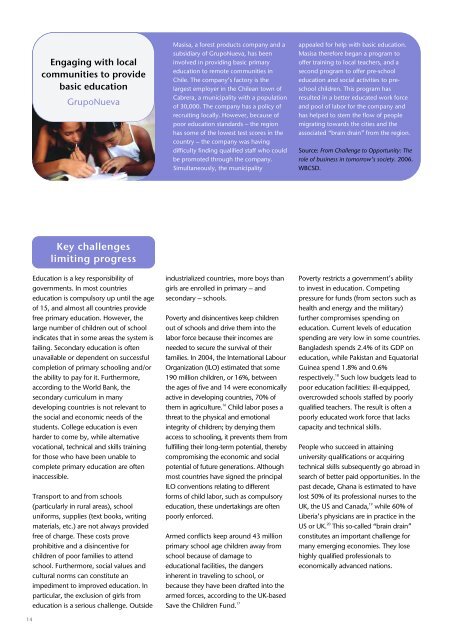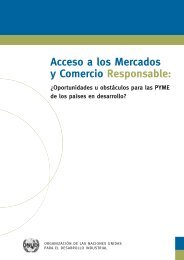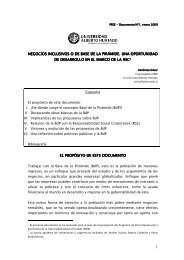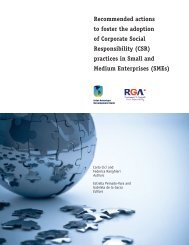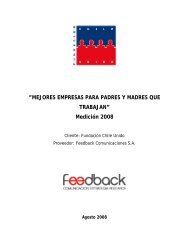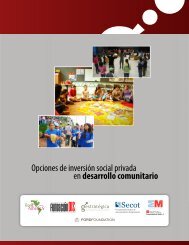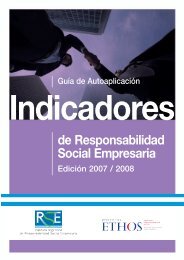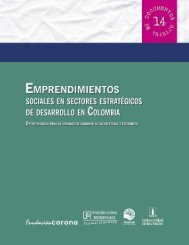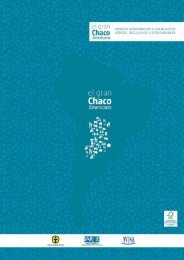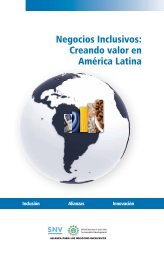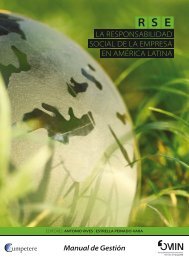Doing Business with the World - Mapeo de Promotores de RSE
Doing Business with the World - Mapeo de Promotores de RSE
Doing Business with the World - Mapeo de Promotores de RSE
You also want an ePaper? Increase the reach of your titles
YUMPU automatically turns print PDFs into web optimized ePapers that Google loves.
Engaging <strong>with</strong> localcommunities to provi<strong>de</strong>basic educationGrupoNuevaMasisa, a forest products company and asubsidiary of GrupoNueva, has beeninvolved in providing basic primaryeducation to remote communities inChile. The company’s factory is <strong>the</strong>largest employer in <strong>the</strong> Chilean town ofCabrera, a municipality <strong>with</strong> a populationof 30,000. The company has a policy ofrecruiting locally. However, because ofpoor education standards – <strong>the</strong> regionhas some of <strong>the</strong> lowest test scores in <strong>the</strong>country – <strong>the</strong> company was havingdifficulty finding qualified staff who couldbe promoted through <strong>the</strong> company.Simultaneously, <strong>the</strong> municipalityappealed for help <strong>with</strong> basic education.Masisa <strong>the</strong>refore began a program tooffer training to local teachers, and asecond program to offer pre-schooleducation and social activities to preschoolchildren. This program hasresulted in a better educated work forceand pool of labor for <strong>the</strong> company andhas helped to stem <strong>the</strong> flow of peoplemigrating towards <strong>the</strong> cities and <strong>the</strong>associated “brain drain” from <strong>the</strong> region.Source: From Challenge to Opportunity: Therole of business in tomorrow’s society. 2006.WBCSD.14Key challengeslimiting progressEducation is a key responsibility ofgovernments. In most countrieseducation is compulsory up until <strong>the</strong> ageof 15, and almost all countries provi<strong>de</strong>free primary education. However, <strong>the</strong>large number of children out of schoolindicates that in some areas <strong>the</strong> system isfailing. Secondary education is oftenunavailable or <strong>de</strong>pen<strong>de</strong>nt on successfulcompletion of primary schooling and/or<strong>the</strong> ability to pay for it. Fur<strong>the</strong>rmore,according to <strong>the</strong> <strong>World</strong> Bank, <strong>the</strong>secondary curriculum in many<strong>de</strong>veloping countries is not relevant to<strong>the</strong> social and economic needs of <strong>the</strong>stu<strong>de</strong>nts. College education is evenhar<strong>de</strong>r to come by, while alternativevocational, technical and skills trainingfor those who have been unable tocomplete primary education are ofteninaccessible.Transport to and from schools(particularly in rural areas), schooluniforms, supplies (text books, writingmaterials, etc.) are not always provi<strong>de</strong>dfree of charge. These costs proveprohibitive and a disincentive forchildren of poor families to attendschool. Fur<strong>the</strong>rmore, social values andcultural norms can constitute animpediment to improved education. Inparticular, <strong>the</strong> exclusion of girls fromeducation is a serious challenge. Outsi<strong>de</strong>industrialized countries, more boys thangirls are enrolled in primary – andsecondary – schools.Poverty and disincentives keep childrenout of schools and drive <strong>the</strong>m into <strong>the</strong>labor force because <strong>the</strong>ir incomes arenee<strong>de</strong>d to secure <strong>the</strong> survival of <strong>the</strong>irfamilies. In 2004, <strong>the</strong> International LabourOrganization (ILO) estimated that some190 million children, or 16%, between<strong>the</strong> ages of five and 14 were economicallyactive in <strong>de</strong>veloping countries, 70% of<strong>the</strong>m in agriculture. 16 Child labor poses athreat to <strong>the</strong> physical and emotionalintegrity of children; by <strong>de</strong>nying <strong>the</strong>maccess to schooling, it prevents <strong>the</strong>m fromfulfilling <strong>the</strong>ir long-term potential, <strong>the</strong>rebycompromising <strong>the</strong> economic and socialpotential of future generations. Althoughmost countries have signed <strong>the</strong> principalILO conventions relating to differentforms of child labor, such as compulsoryeducation, <strong>the</strong>se un<strong>de</strong>rtakings are oftenpoorly enforced.Armed conflicts keep around 43 millionprimary school age children away fromschool because of damage toeducational facilities, <strong>the</strong> dangersinherent in traveling to school, orbecause <strong>the</strong>y have been drafted into <strong>the</strong>armed forces, according to <strong>the</strong> UK-basedSave <strong>the</strong> Children Fund. 17Poverty restricts a government’s abilityto invest in education. Competingpressure for funds (from sectors such ashealth and energy and <strong>the</strong> military)fur<strong>the</strong>r compromises spending oneducation. Current levels of educationspending are very low in some countries.Bangla<strong>de</strong>sh spends 2.4% of its GDP oneducation, while Pakistan and EquatorialGuinea spend 1.8% and 0.6%respectively. 18 Such low budgets lead topoor education facilities: ill-equipped,overcrow<strong>de</strong>d schools staffed by poorlyqualified teachers. The result is often apoorly educated work force that lackscapacity and technical skills.People who succeed in attaininguniversity qualifications or acquiringtechnical skills subsequently go abroad insearch of better paid opportunities. In <strong>the</strong>past <strong>de</strong>ca<strong>de</strong>, Ghana is estimated to havelost 50% of its professional nurses to <strong>the</strong>UK, <strong>the</strong> US and Canada, 19 while 60% ofLiberia’s physicians are in practice in <strong>the</strong>US or UK. 20 This so-called “brain drain”constitutes an important challenge formany emerging economies. They losehighly qualified professionals toeconomically advanced nations.


